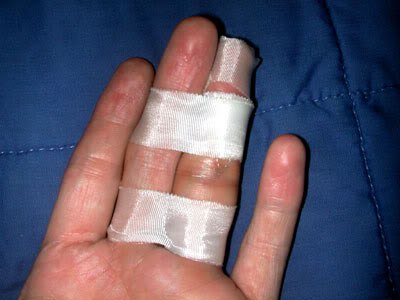What is RSI?
RSI stands for repetitive strain injury.
This is a medical term used to describe any injury that stems from prolonged, repetitive and awkward hand and wrist motions. Forcing the muscles, nerves and tendons in the hand to repeat these motions leads to straining.
There are actually many different kinds of RSI, and different ways to both treat or prevent them. In other parts of the body the condition can be referred to as work-related upper limb disorder or non-specific upper limb pain – this relates to repetitive strain injuries in the torso, neck, shoulders and other parts of the arm.
Modern advances in technology have brought new job roles that have drastically increased the number of RSI cases in the UK.
We are, of course, talking primarily about using a mouse and keyboard in an office. Increased levels of stress have also been said to worsen symptoms.
What causes RSI?
RSI is caused by the continual overuse, or improper use of the muscles and tendons in the hand and fingers.
There are three primary risk factors: poor posture, inadequate technique and overuse of a joint.
There are also a number of secondary risk factors including:
- Have a job that sees you perform repetitive motions
- Live an unhealthy lifestyle
- Suffer from arthritis or diabetes
- Do not exercise regularly enough
- Do not rest your joints enough
- Are double-jointed or loose-jointed
I would like to say thank you to her for her care and professionalism. My scar is healing very well and I understand that it will fade to nothing over time. If you need wrist surgery I cannot recommend Miss Hajipour more highly.
Patient Review – 15th March 2019 – Wythenshawe Hospital
Occupations at increased risk of RSI include:
- computer users
- cooks and chefs
- cleaners
- musicians
- builders
- drivers
Symptoms of RSI
Burning, aching or shooting pain is common and will be accompanied by a tenderness around the joint.
You may find that the fingers are stiff to move, or that there is a tingling-numbness sensation in the tips of the fingers. In some cases the hand may begin to cramp.
RSI symptoms range in severity and develop over time. They will gradually increase in severity as time goes on, leading to longer and more constant bouts of pain. Swelling can take months to subside without anti-inflammatory medication.
Diagnosing RSI
Doctors will be able to diagnose cases of RSI through a physical examination of the afflicted area. They will also conduct a verbal interview regarding the patient’s occupation, lifestyle and any other factors that may have contributed to the case of RSI.
There are two types of RSI:
Type 1 RSI
This is a musculoskeletal disorder and the more common of the two.
It relates to swelling and inflammation of the relevant muscles, tendons and ligaments. When the muscles and tendons are overused tiny tears occur in the tissue, the local area then becomes inflamed. As the body repairs the damage, new scar tissue forms over the small tears.
Usually this would be the end of the process but as RSI is borne out of repetitive misuse of a muscle, scar tissue will continue to form. This leads to more thickening and more pain.
Type 2 RSI
This disorder relates to nerve damage borne out of repetitive misuse of the limb. There are no obvious symptoms apart from pain, so Type 2 RSI is often dubbed “non-specific pain syndrome.”
Treating RSI
With varying causes and symptoms come varying treatment options for RSI.
Some of the common forms of RSI treatment include:
- Splints can be applied to hold the afflicted fingers in place and straighten them out, providing respite to the ligaments and tendons
- Anti-inflammatory medication and painkillers can be taken, along with muscle relaxants, to ease the symptoms of RSI
- Heat or ice packs can be applied to the afflicted area to ease the symptoms, but avoid placing the packs directly onto your skin as this can result in a burn
- Physical therapy can help you to deal with your symptoms by exercising the muscles and training them through strength and conditioning work, this can be especially helpful in the interest of building up your ability to cope with physical demands
- Steroid injections may be administered in severe cases of inflammation, but these shots can have side-effects and as such this RSI treatment method is not applicable to all cases
- Last but not least, you may be in line for a surgical procedure if there are severe problems with nerves, tendons or muscles
Preventing RSI
It’s always going to be difficult to prevent RSI as the source of the injury is more often than not rooted in someone’s job role, and the actions they have to undertake to earn a living. The causes of the injury are a necessary evil.
So what do we do?
If the activity can’t be stopped, we can at least introduce some methods to reduce the insensitivity of the workload.
Here are some ideas:
- Take regular breaks from the repetitive motions to allow your limbs to rest
- Perform exercises to stretch the limbs and break the repetitiveness
- Exercise a balanced and healthy diet to build a resilient body
- Avoid smoking, this reduces blood flow and means muscles take longer to recover
For those who work in an office, the following guidelines may help prevent some of the RSI symptoms:
- Change how you type. Make sure your arms, wrists and fingers are all aligned and try not to press down two hard when you hit a key. There’s no need to slam the keyboard.
- Use mouse shortcuts or voice recognition to reduce the amount spent typing.
Miss Hajipour from the first meeting was definitely concerned about my condition, I felt very comfortable in her company and could talk to her very easily. My operation on my hand was very successful and has given me a lot more movement. Miss Hajipour’s follow up appointment gave me confidence to be able to contact her again if I need more treatment. I would recommend her to anyone with arthritis. Her compassionate nature is second to none.
Patient Review – 26th February 2019 – BMI The Alexandra Hospital
Struggling to recover from a broken finger? Miss Ladan Hajipour is a specialist hand and wrist surgeon, and would be happy to receive your enquiry. Fill in the contact form below if you need to.
Error: Contact form not found.



